Bringing human rights home to U.S.
By Ashahed M. Muhammad -Assistant Editor- | Last updated: Apr 10, 2014 - 9:10:39 AMWhat's your opinion on this article?
Activist group targets torture, mass surveillance, women’s rights and violence
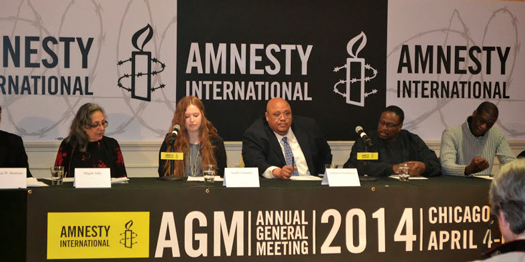
Press conference at Amnesty International USA’s Human Rights Conference 2014 held in Chicago. (L-R) Magda Adly, founding member of the El Nadim Center for the Rehabilitation of Victims of Violence, anti-gun violence activist Sarah Clements, Nathaniel Pendelton, the father of slain teen Hadiya Pendelton, Chicago police torture victims Darrell Cannon and Anthony Holmes. The conference highlighted a number of issues including gun violence, NSA spying, and state-sponsored torture.
|
CHICAGO (FinalCall.com) - You've seen their iconic logo, witnessed their public demonstrations and vigils, or quite possibly you’ve been involved in one of their letter writing campaigns and for this organization, the name says it all—Amnesty International.
The group has a long history as a catalyst for change and effective activism in protection of human rights stretching across continental borders. Working independent of any government, political ideology, economic interests, or religion, Steven W. Hawkins, Amnesty International USA’s executive director, said their group’s supporters—numbering over three-million—are active in over 150 countries and territories.
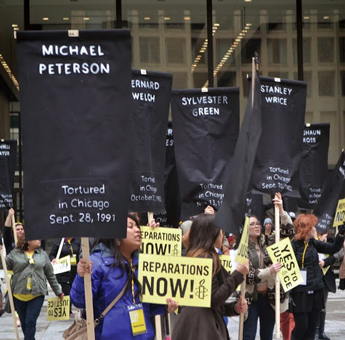
Amnesty International USA held a march through downtown Chicago on April 4 drawing attention to the plight of who have been tortured by police. Photos: Heather Cabral/Amnesty International USA
|
The high-powered grassroots organizational machine and its energetic young members gathered in Chicago April 4-6 for their annual human rights general meeting to address abuses taking place right here in the United States of America. But not only that, they will continue to fight against the death penalty, mass incarceration and on April 5, Mr. Hawkins announced the AIUSA plans to lead one million people in a march in Washington, D.C., to end gun violence.
Mr. Hawkins talked about an incident 30 years ago in which he lost a young 16-year-old whom he mentored, who was shot to death. AIUSA will continue to be involved in other issues such as mass surveillance and women’s rights because the battles are far from over.
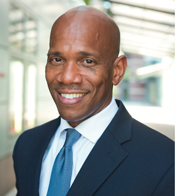
Steven W. Hawkins Executive Director, Amnesty International USA
|
In 1991, Amnesty International’s report calling on the City of Chicago to investigate police torture complaints led to the firing of notorious Cmdr. Jon Burge in 1993. The fight for justice has continued resulting in a reparations ordinance. AIUSA members marched April 4th in support of that ordinance which calls for financial compensation, public memorials, a formal apology, psychological counseling and vocational training and history lessons to be integrated into the curriculum of the Chicago Public School system.
“We are so happy and proud to have Amnesty International step back in and fight for justice for the Chicago police torture survivors,” said Atty. Joey Mogul of the People’s Law Office. “We can send a message that no law enforcement is above the law, or beyond the long arm of the law.”
Gun violence & torture
The January 2013 death of gifted young 15-year-old student Hadiya Pendelton became the incident that represented how troubling the violence in Chicago had become. Nathaniel Pendelton, Hadiya’s father, described how his life changed after a bullet meant for a rival gang member killed his little girl.
“There were no gang members, just the volleyball team,” said Mr. Pendelton. “Today, I am determined—by committing to ending gun violence—to honor the lessons of her life and her death, as painful as that is. She always wanted to make a difference, and she already has,” he added.
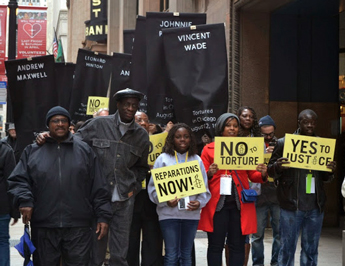
Darrell Cannon and Anthony Holmes joined the marchers on April 4 through downtown Chicago. Both men are victims of torture at the hands of the Chicago police.
|
“Fifteen months ago she was shot, but it was like it was 15 minutes ago,” said Cleopatra Pendelton, Hadiya’s mother.
Chicago’s sordid history of torture by members of the Chicago Police Department spans several decades and has damaged the lives of many. It was a major point of discussion during the weekend.
Darrell Cannon and Anthony Holmes, both torture victims talked about what happened to them, their coerced confessions, false imprisonment, and living with the pain of what took place decades ago. A march and rally was held April 4 downtown.
Margaret Huang, Deputy Executive Director of Campaigns and Programs for Amnesty International USA said the group coming to Chicago was not an attempt to merely capitalize on existing problems to get people into the seats and draw media attention for the conference. AIUSA’s presence here actually represents a concentrated and renewed commitment to a domestic focus, in the process of building a global movement.
“We’ve been working on the death penalty in the United States for decades, we’ve been working on issues of economic rights in the United States for a decade, so it is not new, but what I will say is, it is a renewed commitment to doing this work,” said Ms. Huang. “We’re building a global movement, and you’re not global if you’re not working in the country where you are and if you’re not looking at the violations in your back yard just as you’re looking at the violations in somebody else’s.”
The violations are many, especially as it relates to the Black experience in America. The high profile cases of innocent and unarmed Florida teen Trayvon Martin, killed by George Zimmerman, and the death of innocent and unarmed Jordan Davis, killed by Michael Dunn were mentioned often throughout the weekend as examples of why the human rights issue remains important. Mass incarceration, poor health care and education are stubborn issues with within the Black community.
Surveillance & drones

|
A standout publication from Amnesty International titled “Will I be next?” reported findings determining that extrajudicial assassinations and other targeted killings from U.S. drone strikes in Pakistan may in fact, be considered war crimes.
One panel during the conference titled: “Ending the ‘Forever War’ at Home and Abroad” brought together several knowledgeable individuals to discuss the U.S. government’s violations of human rights under the guise of fighting terrorism and stopping Al-Qaeda. With the tax dollars of American citizens, the government has conducted seemingly endless military operations across the globe, and has created a surveillance heavy police state curtailing civil liberties for large swaths of people, particularly Muslims.
Amnesty International in their campaign to end mass surveillance by the United States government, is urging the Obama administration to roll back many of the sweeping surveillance measures that have continued to expand under his watch. There are reportedly over 30 million surveillance cameras in the U.S. recording an estimated four-billion hours of footage weekly.
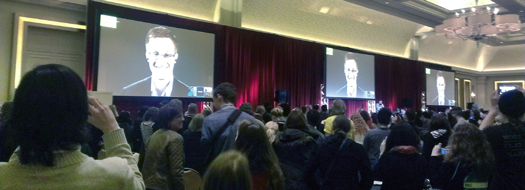
Whistleblower Edward Snowden appeared via video link and spoke to the nearly 1,000 people present April 5. Mr. Snowden was granted political asylum in Russia and faces arrest if he ever attempts to return to the United States. Photo: Ashahed M. Muhammad
|
Investigative journalist Glenn Greenwald, who with award winning journalist Jeremy Scahill recently launched The Intercept, a new digital magazine aimed at shining light on human rights abuses, governmental deception, and intrusion, joined the conference via video link from Brazil to discuss the topic of mass surveillance. He also spoke about the federal government’s targeting of whistleblowers. More people have been prosecuted under the century old Espionage Act by the Obama administration than any other.
Mr. Greenwald’s forthcoming book titled “No Place to Hide: Edward Snowden, the NSA and the U.S. Surveillance State” is eagerly anticipated. He was the first to publish Mr. Snowden’s findings and materials ten months ago. He then announced that he had a special guest, and to the surprise of the audience, whistleblower Snowden appeared via video link. Immediately the nearly 1,000 people in the ballroom stood to their feet and cheered. Mr. Snowden was granted political asylum in Russia and faces arrest if he ever attempts to return to the United States.
Mr. Greenwald and Mr. Snowden in their comments warned that anyone involved in activism and making a difference is being spied upon by the government, and whatever the government admits to doing related to surveillance and monitoring—there’s even more than that taking place. Specifically, Mr. Snowden warned about the government’s monitoring of “Metadata” which consists of which telephone numbers are calling other numbers, when calls are being made and their length enabling the tracking of associations and political inclinations. Metadata is what allows the government to see “a precise record of all of the private activities of all our lives,” said Mr. Snowden.
“I took a big risk to bring this information back into the public (but) this information shouldn’t have been classified in the first place,” Snowden said. “The fact that everyone in the world knows about this now makes us all safer and it is an incredibly empowering and encouraging thing to see people talking about this,” Mr. Snowden added.
“What we need to understand is that, this isn’t about being watched. The conversation we’re having isn’t about what we are saying on Facebook,” said Mr. Snowden. “It is about the relationship between the public and the government,” he added.
“When we see that even senior officials are violating the constitution, we have a duty and an obligation to tell the public and let the public decide what should be done,” said Mr. Snowden.
Though Snowden knew he would likely spend the rest of his life in prison for what he did, he “never once expressed an iota of remorse or regret” because he was so certain that he did the right thing, which Mr. Greenwald said inspired him to do his best to make this information to the public.
Greenwald advised activists to use encryption software to make it more difficult for their communications to be monitored, and not to think it is being paranoid or to underestimate the value of their work and importance.
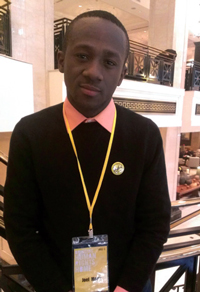
Joel Manu, 24 year-old student activist at Roosevelt University
|
Ghanaian Joel Manu, a 24-year-old Math major at Roosevelt University works for a law firm. He loved connecting with other activists from across the country and his mind was opened hearing the different stories of activism and realized that everyone can make a difference.
“The next step is to keep on spreading the word and continue to let people know what is really happening,” said Mr. Manu. “Now I know that I don’t have to have a major in political science or psychology to fight for freedom and justice. Everybody is supposed to know what is right,” he added.
INSIDE STORIES AND REVIEWS
-
-
About Harriett ... and the Negro Hollywood Road Show
By Rabiah Muhammad, Guest Columnist » Full Story -
Skepticism greets Jay-Z, NFL talk of inspiring change
By Bryan 18X Crawford and Richard B. Muhammad The Final Call Newspaper @TheFinalCall » Full Story -
The painful problem of Black girls and suicide
By Charlene Muhammad -National Correspondent- » Full Story -
Exploitation of Innocence - Report: Perceptions, policies hurting Black girls
By Charlene Muhammad -National Correspondent- » Full Story -
Big Ballin: Big ideas fuel a father’s Big Baller Brand and brash business sense
By Bryan Crawford -Contributing Writer- » Full Story






 Click Here Stay Connected!
Click Here Stay Connected!








